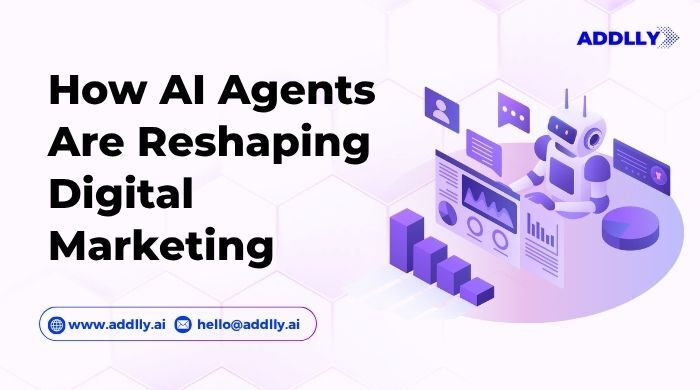AI agents are fundamentally reshaping how businesses operate and approach digital marketing, ushering in a new era of intelligent, data-driven decision making. Unlike simple automation tools that handle repetitive tasks, modern AI-powered agents combine machine learning, natural language processing (NLP), and predictive analytics to understand user behavior, analyse market trends, and create personalized content that resonates with customers across platforms.
Quick Summary – How AI Agents Are Reshaping Digital Marketing
AI agents are revolutionizing digital marketing by combining machine learning, predictive analytics, and natural language processing to create smarter, data-driven marketing strategies. These AI agents manage everything from content creation to performance measurement, ensuring brands stay ahead in a rapidly changing landscape. With Addlly AI’s marketing agents, marketers can automate tasks, refine campaigns in real-time, and optimize content for AI search platforms. The future of marketing is a collaboration between AI and human creativity, enhancing efficiency and improving customer experiences.
- AI Agents: Automate tasks, analyze data, and optimize campaigns across channels.
- Content Creation: AI agents craft personalized, on-brand content at scale.
- Real-Time Optimization: Agents refine strategies based on live data and customer engagement.
- GEO Optimization: AI Agents for GEO improve search visibility by structuring content around key entities.
- Future of Marketing: AI agents empower marketers, allowing them to focus on creativity, strategy, and customer relationships
How Search Behavior Has Evolved from Google to AI Search
As search behavior shifts toward AI-powered platforms like ChatGPT and Perplexity, marketing teams must adapt by implementing intelligent agents that can manage end-to-end marketing efforts, from SEO audits and Google Ads optimization to social media posts and audience engagement. These systems can analyze real-time data, adapt to changing customer preferences, and execute effective strategies that build lasting brand loyalty while reducing operational costs.
This transformation marks the move from simple automation to agentic AI, where multiple AI agents work collaboratively like a virtual marketing department. Each agent specializes in specific tasks, whether analyzing data, tailoring content, or managing ad placements, while maintaining human oversight to ensure alignment with brand voice and objectives. The result is an intelligent ecosystem that helps brands stay ahead, improve customer experience, and enhance conversion rates through smarter, faster, and more contextual content creation.
Read more about: GEO Mistakes That Brands are Making
Automated Content Strategy and Campaign Planning
In the past, marketing teams relied heavily on manual data collection and intuition. With AI Agents, they can evaluate first-party data, social listening insights, and seasonal search trends to recommend the right content creation plan for every stage of the customer journey. They help brands identify content gaps, optimal publishing times, and cross-channel alignment to ensure that blogs, newsletters, and ads all reinforce one another.
Modern AI systems also:
- Analyze customer behavior to predict future interests and purchase history.
- Suggest ad placements and optimal timing for content distribution.
- Continuously refine strategies based on engagement metrics and real-time analytics.
Unlike traditional tools that simply automate repetitive tasks, learning agents actively recommend adjustments to improve performance, ensuring campaigns remain effective without constant human intervention.
Data-Driven Campaign Development
AI marketing strategy agents handle enormous volumes of data, from website traffic patterns to customer intent signals, transforming raw information into actionable insights. They use predictive analytics and machine learning to correlate past interactions with future trends, identifying what truly drives customer engagement and conversion rates.
This allows marketers to:
- Understand audience intent more precisely.
- Tailor campaigns to match customer preferences.
- Automate repetitive tasks like report generation and topic clustering.
- Make more informed strategic decisions about where to invest their marketing budget.
The result is a self-improving system that minimizes waste and maximizes impact, allowing brands to focus on creative direction while their AI tools handle the analytical heavy lifting.
Multi-Channel Content Planning
Today’s consumers engage across platforms, from email newsletters to social media and AI-powered chatbots. AI agents ensure that every piece of content, regardless of format, reinforces consistent messaging while adapting tone and structure to the platform.
They create synchronized content calendars that align with product launches, seasonal events, and trending discussions. By analyzing user behavior and optimal times for posting, they recommend when to publish blog content or when to schedule social posts for maximum reach.
For example:
- Post long-form thought leadership articles during weekday mornings for B2B audiences.
- Share visual, story-driven content on Instagram during evening hours when engagement peaks.
- Repurpose blog insights into social media posts or short-form videos to maintain omnichannel presence.
This multi-agent coordination ensures consistent messaging, reinforcing brand loyalty while optimizing visibility across all customer touchpoints.
Read our guide on: How to Rank in AI Search Results
Brand-Trained Content Creation at Scale
One of the most powerful applications of agentic AI is the creation of brand-trained AI agents. These learning agents absorb a company’s existing content, style guides, and messaging tone to generate on-brand material at scale.
Unlike generic AI tools, these systems don’t just write, they understand how a brand communicates, capturing nuances in tone, structure, and emotion. The result is personalized content that feels authentically human while maintaining consistency across languages and regions.
These agents also:
- Use natural language processing to adapt messaging for different audiences.
- Maintain consistent voice across blogs, ads, and social posts.
- Reflect brand values while improving customer satisfaction and engagement.
By learning from successful content, they replicate effective communication patterns, reducing the need for human agents to rewrite or edit every output. This saves time, lowers operational costs, and ensures every piece of content strengthens brand identity.
Multi-Language Market Adaptation
Global businesses often struggle with localization, it’s not just about translation but cultural adaptation. AI agents now use machine learning and natural language processing to tailor content for local markets.
They understand regional search behavior, cultural references, and emotional tone, allowing brands to tailor content that resonates with different audiences while keeping core brand values intact.
For example, they can identify that a product benefit valued in Asia differs from what European audiences prioritize, then adjust messaging accordingly. This approach builds deeper customer engagement, improves customer satisfaction, and enhances global brand loyalty.
Format-Specific Optimization
Every platform has its nuances. AI agents automatically adjust content creation for length, tone, and style based on the medium, whether a 2,000-word blog, a tweet, or an email subject line.
They use real-time analytics to determine which versions perform best and refine them continuously. For instance:
- Transform a long-form article into an infographic or carousel post.
- Adapt formal web copy into conversational content for AI-powered chatbots.
- Shorten headlines to meet SEO title requirements while preserving impact.
These optimizations ensure content is always tailored to audience intent and platform constraints without losing the brand’s essence.
AI Search Visibility and GEO Optimization
With the rise of generative AI and AI-powered search engines, brands must optimize for Generative Engine Optimization (GEO), a strategy designed to help AI systems recognize and cite brand content.
AI agents specialize in structuring content around entities and factual clarity. They ensure information is precise, authoritative, and citation-worthy, increasing the likelihood of appearing in responses generated by AI assistants or virtual agents.
This involves:
- Building strong entity relationships between products, services, and topics.
- Enhancing factual accuracy and structured data.
- Creating comprehensive, trustworthy content that AI systems can confidently reference.
By mastering GEO, businesses maintain visibility not only in search engines but also in conversational platforms, ensuring their brand remains discoverable in the near future of AI-driven search.
Real-Time SEO and Performance Auditing
Gone are the days of monthly SEO reviews. AI agents now perform real-time SEO monitoring, constantly scanning websites for performance issues and ranking fluctuations.
These AI SEO Tools track customer behavior, identify keyword opportunities, and recommend updates before problems impact visibility. These systems help marketing teams operate effectively and make data-driven insights actionable immediately.
They can:
- Detect broken links and page speed issues.
- Track competitor movements and ad placements.
- Recommend new keywords based on emerging trends.
This agility enables proactive optimization, ensuring brands stay competitive in volatile markets without waiting for human intervention.
Social Listening and Sentiment-Driven Content
Modern AI tools also enhance customer experience by monitoring real-time conversations on social platforms, forums, and review sites. These Social Listening AI Agents analyze user interactions and emotional tone to uncover opportunities for engagement and brand advocacy.
These agents allow marketers to:
- Identify emerging trends and viral topics early.
- Address negative sentiment before it escalates.
- Develop personalized content that reflects audience concerns and values.
By aligning with real-time conversations, brands improve authenticity, responsiveness, and customer engagement, fostering brand loyalty through genuine interaction rather than scripted responses.
Integrated Workflow and Team Collaboration
Advanced AI-powered systems integrate seamlessly into existing tools like WordPress, Shopify, and email marketing platforms. They automate publishing, manage approvals, and track performance, reducing manual effort and human error.
This means marketing teams can focus on creativity and strategic thinking while their AI counterparts handle scheduling, formatting, and analytics.
For example, solutions like Addlly AI’s Newsletter Generator automatically create professional newsletters, apply brand styling, and prepare them for email distribution without manual intervention.
By acting as virtual assistants, these agents help marketing teams complete tasks faster, cut down routine workloads, and ensure consistency across every marketing channel.
Performance Measurement and Optimization
AI agents continuously track performance metrics like engagement rates, lead scoring, and conversion outcomes. They reveal what’s working, and why, helping teams optimize content strategies based on real evidence rather than guesswork.
These insights also show:
- Which content types drive the most customer engagement.
- How different channels contribute to overall conversion rates.
- Where to focus efforts to deliver the most value for marketing spend.
Through continuous learning, these agents evolve alongside audience needs and market conditions, making them indispensable tools for any team looking to stay ahead in the new era of AI-powered marketing.
FAQs – AI Agents Changing Digital Marketing
How do AI Agents Help With Multi-Channel Marketing?
AI agents ensure consistent messaging across all marketing channels by analyzing user behavior and recommending the best times to publish and the optimal content format. For example, they can suggest when to post long-form articles or visual content, helping brands maintain an omnichannel presence and improve customer engagement.
How do AI Agents Use Data to Optimize Campaigns?
AI agents use real-time data to track engagement metrics and customer behavior. They analyze these insights to make continuous improvements, suggesting adjustments for content timing, ad placements, and audience targeting. This ensures campaigns stay effective and aligned with customer preferences.
What Role Does GEO (Generative Engine Optimization) Play in AI-driven Marketing?
GEO optimizes content for AI search engines by ensuring it is structured and factually accurate. AI agents help improve search visibility by building strong entity relationships between products, services, and topics, increasing the likelihood of content being cited in AI-generated answers across platforms like ChatGPT and Google.
Can AI Agents Help in Real-time SEO and Performance Auditing?
Yes, AI agents continuously monitor your website for SEO issues and track performance in real-time. They can detect broken links, keyword opportunities, and even competitor movements, recommending updates before performance issues impact visibility. This proactive approach helps brands stay competitive and ensure their content remains optimized.


